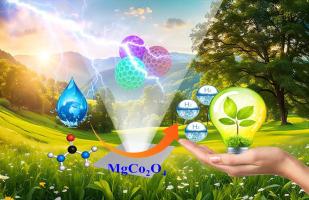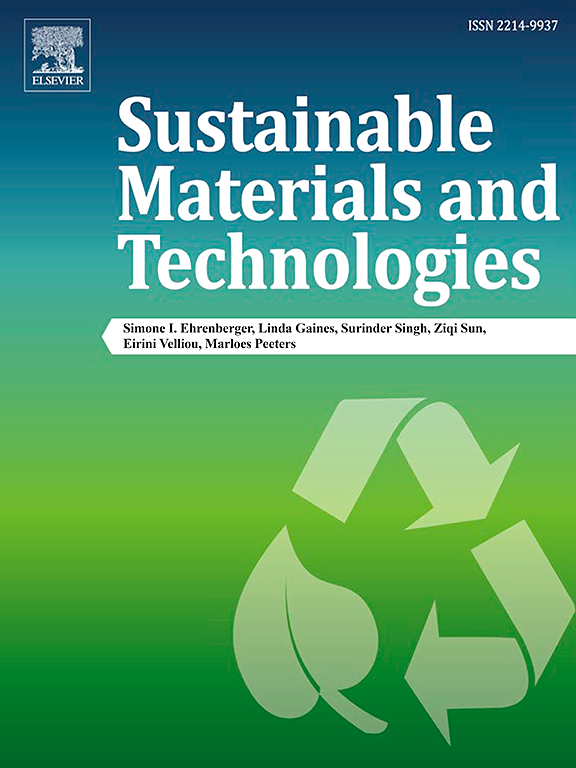Boosting sustainable hydrogen production via water splitting and urea oxidation using spinel hollow-sphere nano catalysts
IF 9.2
2区 工程技术
Q1 ENERGY & FUELS
引用次数: 0
Abstract
In this study, spinel MgCo2O4 materials were synthesized using three different techniques: freeze-drying, solid-state, and hydrothermal methods, to evaluate their structural, morphological, and electrocatalytic properties. Comprehensive characterization techniques including XRD, Raman spectroscopy, FT-IR, FESEM, HRTEM, and XPS confirmed the successful formation of phase-pure MgCo2O4 with varied morphologies. Among the synthesized materials, the freeze-dried sample exhibited a well-defined hollow-sphere structure, providing abundant electroactive sites and superior electron/mass transport pathways. This morphology contributed to outstanding electrocatalytic performance. For the oxygen evolution reaction (OER), the hollow-sphere MgCo2O4 catalyst demonstrated a low overpotential of 430 mV at 10 mA cm−2 and a Tafel slope of 190 mV dec−1. In addition, the same catalyst exhibited excellent activity for the urea oxidation reaction (UOR), with a Tafel slope of 95 mV dec−1 and enhanced current density under alkaline conditions. The superior UOR activity, enabled by the lower oxidation potential of urea (∼0.37 V vs. RHE), also highlights its potential for energy-efficient hydrogen production and wastewater treatment. This work establishes a scalable and cost-effective strategy to synthesize high-performance MgCo2O4 hollow-sphere electrocatalysts, paving the way for their application in sustainable energy and environmental technologies.

利用尖晶石空心球纳米催化剂通过水裂解和尿素氧化促进可持续制氢
本研究采用冷冻干燥、固态和水热三种不同的方法合成尖晶石MgCo2O4材料,并对其结构、形态和电催化性能进行了评价。采用XRD、拉曼光谱、FT-IR、FESEM、HRTEM、XPS等综合表征技术,成功合成了形貌各异的相纯MgCo2O4。在合成的材料中,冻干样品表现出明确的空心球体结构,提供了丰富的电活性位点和优越的电子/质量传递途径。这种形态有助于突出的电催化性能。对于析氧反应(OER),空心MgCo2O4催化剂在10 mA cm−2下的过电位为430 mV, Tafel斜率为190 mV dec−1。此外,该催化剂在尿素氧化反应(UOR)中表现出优异的活性,在碱性条件下,Tafel斜率为95 mV dec−1,电流密度增强。由于尿素的氧化电位较低(与RHE相比为0.37 V), UOR活性优异,这也凸显了其在节能制氢和废水处理方面的潜力。本研究建立了一种可扩展且具有成本效益的策略来合成高性能MgCo2O4空心球电催化剂,为其在可持续能源和环境技术中的应用铺平了道路。
本文章由计算机程序翻译,如有差异,请以英文原文为准。
求助全文
约1分钟内获得全文
求助全文
来源期刊

Sustainable Materials and Technologies
Energy-Renewable Energy, Sustainability and the Environment
CiteScore
13.40
自引率
4.20%
发文量
158
审稿时长
45 days
期刊介绍:
Sustainable Materials and Technologies (SM&T), an international, cross-disciplinary, fully open access journal published by Elsevier, focuses on original full-length research articles and reviews. It covers applied or fundamental science of nano-, micro-, meso-, and macro-scale aspects of materials and technologies for sustainable development. SM&T gives special attention to contributions that bridge the knowledge gap between materials and system designs.
 求助内容:
求助内容: 应助结果提醒方式:
应助结果提醒方式:


